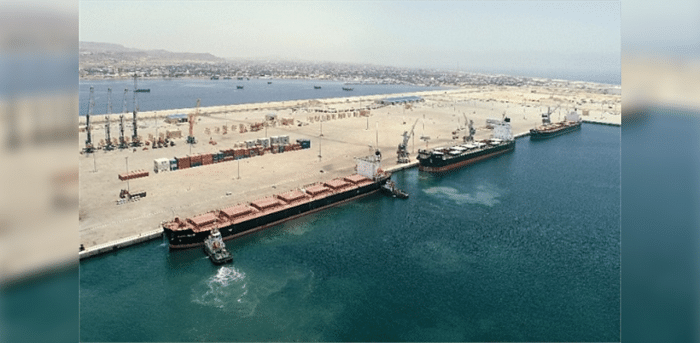
Amid signs of a growing partnership between Beijing and Tehran, New Delhi has proposed the inclusion of the Chabahar Port on the southeastern coast of Iran in the International North South Transport Corridor (INSTC), which is being seen as a counterweight to the Belt-and-Road Initiative (BRI) of China.
With China wooing Iran to take part in its ambitious but controversial cross-continental connectivity project, India has called for expansion of the INSTC to include Uzbekistan and Afghanistan.
External Affairs Minister S Jaishankar on Thursday said India welcomed the interest of Uzbekistan and Afghanistan to join the INSTC. “India has also proposed the inclusion of Chabahar in the INSTC route. I am hopeful that during the INSTC Coordination Council meeting, member states would agree to the expansion of the INSTC route to include the Chabahar Port and also agree on expanding the membership of this project,” he said, addressing the Maritime India Summit hosted by the Prime Minister Narendra Modi’s government in New Delhi.
India, Russia and Iran had jointly conceived the INSTC in September 2000 as a multi-modal transportation corridor, which would link the India Ocean and the Persian Gulf with the Caspian Sea through Iran and move onward to North Europe via Russia. Belarus, Kazakhstan, Tajikistan, Oman, Armenia, Syria, Azerbaijan, Turkey, Ukraine and Kyrgyzstan joined the ambitious project later. Bulgaria joined the bloc as an observer.
Though the INSTC project has not made much progress on the ground over the past two decades, Prime Minister Narendra Modi’s government in New Delhi is learnt to have now decided to fast-track it, ostensibly to counter China’s BRI, which has been mired in controversies due to the communist country’s predatory lending policies that lure smaller nations into debt-traps.
India remains opposed to the BRI, as its flagship project, China Pakistan Economic Corridor (CPEC), runs through Jammu and Kashmir areas, which it claims to be its own, but accuses the neighbouring Islamic Republic of illegally occupying.
Jaishankar on Thursday also suggested establishing an eastern corridor of the INSTC through Afghanistan in order to maximize its potential.
Beijing’s plan to ink a deal with Tehran for a whopping $ 400 billion investment by China in infrastructure and energy sectors in Iran over the next 25 years sent the alarm bells ringing in New Delhi a few months back. India is also worried over purported moves by China and its “iron brother” Pakistan to get a toehold in the Chabahar Port of Iran.
India is participating in the development of the first phase of Shahid Beheshti Port in Chabahar in cooperation with Iran. The port opens up sea-land connectivity between India and Afghanistan as well as Central Asia and beyond, bypassing Pakistan. The India Ports Global Limited took over port operations at the Shaheed Beheshti Port in Chabahar in December 2018 and has been handling cargo since then. Afghanistan also started using the port facility to send its first export consignment to India early last year.
New Delhi is concerned over the prospect of Islamabad and Beijing expanding footprints on Chabahar Port if it is connected with Gwadar Port in Pakistan as proposed by Iran. India perceives Chabahar Port in Iran as a counterweight to the Gwadar Port, which China developed as part of its “String of Pearls” policy to develop strategic assets encircling India. What also made New Delhi worried is the possibility of the Chabahar Port being linked to the Belt and Road Initiative (BRI) of China, if it is connected with the Gwadar Port – the endpoint of the CPEC.
